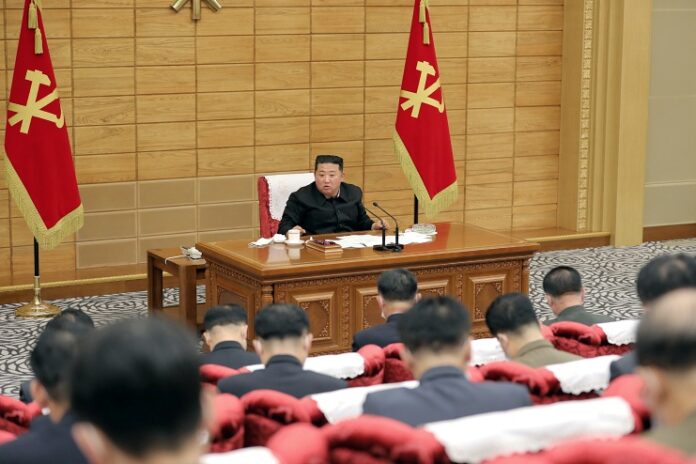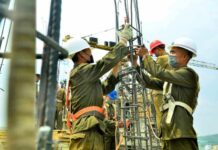
North Korean leader Kim Jong Un’s recent harsh criticism of cadres and officials for problems in the distribution of COVID-19 medicines has not been welcomed by everyone in the country.
A source in North Hamgyong Province told Daily NK on Thursday that North Korean TV and newspapers have been continuously carrying Kim’s sharp criticism of cadres over the condition of the medical system and medication supplies.
“Among themselves, however, people say that the problems aren’t the fault of the cadres,” he said.
According to North Korean media, the politburo held an emergency consultative meeting on Sunday, during which leaders intensively discussed measures to correct “deviations” in the supply of medications.
Pointing out that the “medicines provided by the state have not been supplied to people through pharmacies correctly in time,” Kim said it is “because officials of the Cabinet and public health sector in charge of the supply have not rolled up their sleeves, not properly recognizing the present crisis but [are] only talking about the spirit of devotedly serving the people.”
The North Korean leader strongly criticized the Cabinet and public health officials for their “irresponsible work attitude, and their ability to organize and execute [policy].”
In particular, he censured the director of the Central Public Prosecutors Office for “idleness and negligence of his duties.”
Kim also slammed judicial and prosecutorial officials, saying they “failed to exercise legal supervision and control properly and correct several negative phenomena in the nationwide handling and sale of medicines so as to make the administrative order concerning the supply of medicines be immediately and exactly carried out.”
The source said, however, that problems in the distribution of medications are nothing new.
North Korea’s healthcare system practically collapsed with the start of the “Arduous March” of the 1990s, and North Koreans have been providing for their own needs by procuring medicines from markets or private drug merchants.
After taking power in 2012, Kim began taking measures to resolve problems in the drug supply, setting up pharmacies in major cities. The impact of those measures has been negligible, however, and people are still buying drugs from markets or private merchants.
North Korea’s closure of the border to prevent the spread of COVID-19 in January 2020 created a drug scarcity, and markets and private merchants began selling drugs at much higher prices.
Given these circumstances, many North Koreans blame the drug supply problems not on government cadres, but on the leadership’s closure of the border for over two years. Medications have long been scarce due to the border closure, which has meant that problems with the supply and sale of drugs have been inevitable.
Nonetheless, North Korea’s leadership is trying to quiet public discontent by blaming innocent cadres.
“The leadership just issues empty orders to ease the lives of the people, but take none of the necessary practical measures,” said the source. “The conditions cadres must have to do their jobs don’t exist, and with the government issuing such orders and scolding them, how are the problems supposed to get solved?”
The government again appears to be shifting responsibility in regards to a problem with obvious origins, making it seem as if a “grave incident” occurred due to official negligence, the source continued.
“However, this isn’t the first time something like this has happened, so nobody will be fooled,” he added.
Translated by David Black. Edited by Robert Lauler.
Please direct any comments or questions about this article to dailynkenglish@uni-media.net.

















